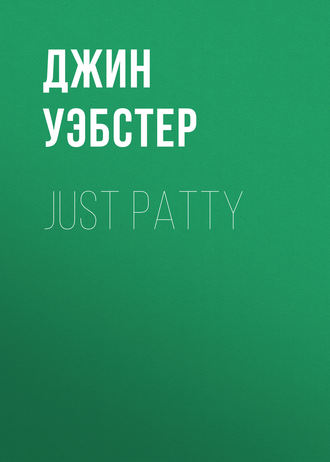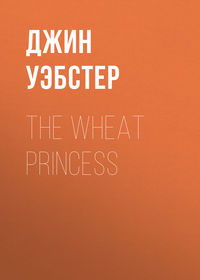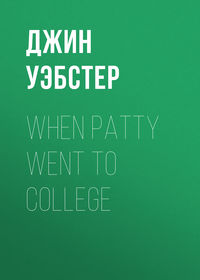 полная версия
полная версияJust Patty
"We're going to become beautiful and fascinating, with a fatal charm that ensnares every man who approaches."
"Do you think we can?" There was some doubt in Patty's tone.
"Mae's got a book," put in Rosalie eagerly, "about 'Beauty and Grace.' You soak your face in oatmeal and almond-oil and honey, and let your hair hang in the sun, and whiten your nose with lemon juice, and wear gloves at night, and—"
"You really ought to have a bath of asses' milk," interrupted Mae. "Cleopatra had; but I'm afraid it will be impossible to get."
"And you ought to learn to sing," added Rosalie, "and have some one song like the 'Lorelei!' that you always hum when you're about to ensnare a victim."
The project was foreign to Patty's ordinary train of thought, but it did have an element of novelty and allurement. Neither Mae nor Rosalie were the partners she would naturally have chosen in any enterprise, but circumstances had thrown them together that day, and Patty was an obliging soul. Also, her natural common sense was wandering; she was still under the spell of the Egyptian sorceress.
They discussed the new society for several minutes more, until they heard the murmur of Miss Lord's voice, bidding Mademoiselle goodnight.
"There's Lordy!" Patty whispered warily. "I think you'd better to go to bed. We can plan the rest in the morning."
"Yes, let's," said Rosalie, with a shiver. "I'm freezing!"
"But we must first take the vow," insisted Mae Mertelle. "We ought really to do it at midnight—but maybe half-past ten will do as well. I've got it all planned. You two say it after me."
They joined hands and whispered in turn:
"I most solemnly promise to keep secret the name and object of this society; and if I break this oath, may I become freckled and bald and squint-eyed and pigeon-toed, now and forever more."
The three members of the S. A. S. devoted their leisure during the next few days to a careful study of the work on Beauty; and painstakingly set about putting its precepts into practice. Some of these seemed perplexingly at variance. The hair, for example, was to be exposed to air and sunlight, but the face was not. They cleverly circumvented this difficulty however. The week's allowance went for chamois-skin. During every recreation hour, they retired to an airy knoll in the lower pasture, and sat in a patient row, with hair streaming in the wind, and faces protected by homemade masks.
One afternoon, a little Junior A, wandering far afield in a game of hide-and-seek, came upon them unawares; and returned to the safe confines of the playground with frightened shrieks. Dark rumors began to float about the school as to the aim and scope of the new society. Suggestions ranged all the way from Indian squaws to Druid priestesses.
They almost met with disaster while acquiring the ingredients of the oatmeal poultice. The oatmeal and lemon were comparatively easy; the cook supplied them without much fuss. But she stuck at the honey. There were jars and jars of strained honey in the storeroom; but the windows were barred, and the key was in the bottom of Nora's pocket. Confronted by the immediate necessity of becoming beautiful, they could not placidly sit down for five days, and wait for the weekly shopping trip to the village. Besides, with a teacher in attendance, there would be no possible chance of making the purchase. Honey was a contraband article, in the same class with candy and jam and pickles.
They discussed the feasibility of filing through the iron gratings, or of chloroforming Nora and stealing the key, but in the end Patty accomplished the matter by the use of a little simple blarney. She dropped into the kitchen one afternoon with the plaintive admission that she was hungry. Nora hastened to supply a glass of milk and a piece of bread and butter, while Patty perched on a corner of the carving-table and settled herself for conversation. The girls were not supposed to visit the kitchen, but the law was never rigidly enforced. Nora was a social soul and she welcomed callers. Patty praised the apple dumplings of last night's dessert; progressed from that to a discussion of the engaging young plumber who at the moment claimed all of Nora's thoughts; then, by a natural transition, she passed to honey. Before she left, she had obtained Nora's promise to substitute it for marmalade the next morning at breakfast.
The members of the S. A. S. brought pin-trays to the meal, and unobtrusively transferred a supply from their plates to their laps.
But even so, disaster still threatened. Patty had the misfortune to collide with Evalina Smith in the upper hall, and she dropped her pin-tray, honey-side down, in the middle of the rug. At the same instant, Miss Lord bore down upon her from the end of the corridor. Patty was a young person of resource; the emergency of the moment rarely found her napping. She plumped down on her knees in the midst of the puddle, and with widespread skirts, commenced frantically searching for an imaginary stick-pin.
"Is it necessary for you to block up the entire hall?" was Miss Lord's only comment as she passed.
The rug was happily reversible, and by the simple process of turning it over, Patty satisfactorily cleaned up the mess. The other two girls were generous, and shared their supply: so in the end she obtained her honey.
For three wakeful nights they stuck to the poultice—though perhaps it would be more accurate to say that the poultice stuck to them. In spite of many washings in hot water, their faces became noticeably scaly.
Miss Sallie, who represented St. Ursula's board of health, met Patty Wyatt in the hall one morning. She took her by the chin and turned her to the light. Patty squirmed embarrassedly.
"My dear child! What is the matter with your face?"
"I—I don't know—exactly. It seems sort of—of—dandruffy."
"I should think it did! What have you been eating?"
"Only what I get at meals," said Patty, relievedly telling the truth.
"There's something the matter with your blood," diagnosed Miss Sallie. "What you need is a tonic. I shall prescribe boneset tea for you."
"Oh, Miss Sallie!" Patty earnestly remonstrated. "I don't need it, really. I'm sure I'll be all right." She had tried boneset tea before; it was the bitterest brew that was ever concocted.
When Miss Sallie met Mae Van Arsdale suffering from the same complaint, and later still, Rosalie Patton, she commenced to be perturbed. The apple trees under her care at the farm had been afflicted that spring with San José scale, but she had hardly expected the disease to spread to the school girls. That afternoon she superintended an infusion of boneset, of gigantic proportions, and at bedtime a reluctant school formed in line and filed past Miss Sallie, who, ladle in hand, presided over the punch bowl. Each received a flowing cupful and drank it with what grace she might, until Patty's turn came. She disposed of hers in a blue china umbrella holder which stood in the hall behind Miss Sallie's back. The remainder of the line successfully followed her lead.
Miss Sallie watched her little charges closely for the next few days; and sure enough, the scales disappeared. (The Associated Sirens had discarded poultices.) She was more than ever convinced of the efficacy of boneset.
Shortly after the founding of the society, Mae Mertelle returned from a week-end visit to her home. (Her mother was ill and she had been sent for. Someone in Mae's family was conveniently ill a great deal of the time.) She brought with her three bracelets of linked scales representing a serpent swallowing his tail. S. A. S. in tiny letters was engraved between the emerald eyes.
"They are perfectly sweet!" said Patty, with grateful appreciation. "But why a snake?"
"It isn't a snake; it's a serpent," Mae explained. "To represent Cleopatra. She was the Serpent of the Nile. We'll be Serpents of the Hudson."
With the appearance of the bracelets, curiosity in the S. A. S. increased, but unlike the other secret societies which had appeared from time to time, its raison d'être remained a mystery. The school really commenced to believe that the society had a secret. Miss Lord, who had the reputation of being curious, stopped Patty one day as she was leaving the Virgil class, and admired the new bracelet.
"And what may be the meaning of S. A. S.?" she inquired.
"It's a secret society," said Patty.
"Ah, a secret society!" Miss Lord smiled. "Then I suppose the name is a deep mystery." She lowered her voice, as she said it, to sepulchral depths.
There was something peculiarly irritating about Miss Lord's manner; it always suggested that she was amused by the vagaries of her little pupils. She did not possess Miss Sallie's happy faculty of meeting them on a level. Miss Lord peered down from above (through lorgnettes).
"Of course the name is a secret," said Patty. "If that got out, it would give the whole thing away."
"And what is the object of this famous society? Or is that too a secret?"
"Why, yes, that is, I mustn't tell you exactly."
Patty smiled up at Miss Lord with the innocent, seraphic gaze that always warned those who knew her best that is was wisest to let her alone.
"It's a sort of branch of the Sunshine Society," she added confidentially. "We're to—well—to smile on people, you know, and make them like us."
"I see!" said Miss Lord, with an air of friendly understanding. "Then S. A. S. stands for 'Sunshine and Smiles?'"
"Oh, please! You mustn't say it out loud," Patty lowered her voice and threw an anxious glance over her shoulder.
"I wouldn't tell anybody for worlds," Miss Lord promised solemnly.
"Thank you," said Patty. "It would be dreadful if it got out."
"It is a very sweet, womanly society," Miss Lord added approvingly. "But you ought not to keep it all to yourselves. Can't you let me be an honorary member of the S. A. S.?"
"Certainly, Miss Lord!" said Patty sweetly. "If you care to belong, we should love to have you."
"Lordy wants to be a Siren!" she announced to her two fellow members when she met them shortly in the gymnasium. The account of the interview was received with hilarity. Miss Lord was anything but the accepted type of siren.
"I thought a few smiles might relieve the gloom of Latin class," Patty explained. "It amuses Lordy to think she's helping the children in their play; and it doesn't hurt the children."
For a time the S. A. S. flourished with the natural health of youth, but as the novelty wore off, the business of becoming beautiful grew onerous. Mae and Rosalie continued to study the beauty book with dogged perseverance,—the subject lay along the line of their natural ambitions—but Patty felt other matters calling. Spring field sports had commenced, and the nearness of the annual match with Highland-Hall, crowded out her interest in cold cream and almond meal. She and Mae were not naturally simpatica, and in spite of Mae's insistence, Patty became an apathetic siren.
One Saturday just after the spring recess, Patty received permission to lunch in town with "Uncle Bobby." He was an uncle by courtesy only, but Patty had failed to inform the Dowager that the title was not his by natural right. She knew well what the result would be. It is quite proper to have luncheon with an uncle; and quite improper with even the oldest and baldest of family friends.
When the "hearse" returned from the station at dusk with Mademoiselle and the city contingent, Rosalie Patton was waiting the arrival on the porte-cochère. She separated Patty from the group and whispered in her ear.
"The most awful thing has happened!"
"What?" Patty demanded.
"The S. A. S. All is discovered!"
"Not really!" cried Patty, aghast.
"Yes! Come in here."
Rosalie drew her into the empty cloak-room and shut the door.
"You mean—they've found out the name—and everything?" Patty demanded breathlessly.
"Not quite everything, but they would have if it hadn't been for Lordy. She saved us for once."
"Lordy saved us!" There was incredulity mixed with Patty's horror. "What do you mean?"
"Well, yesterday, Mae went shopping in the village with Miss Wadsworth—and you know what kind of a chaperone Waddy makes." Patty nodded impatiently. "Anybody could fool her. And Mae, right under her very nose, commenced a flirtation with the Soda-Water Clerk."
"Oh!" said Patty hotly. "How perfectly horrid!"
"She didn't care anything about it, really. She was just trying to put the principles of the S. A. S. into practice."
"She might at least have picked out somebody decent!"
"Well, he is quite decent. He's engaged to the girl at the underwear counter in Bloodgood's, and he didn't want to be flirted with a bit. But you know how persistent Mae Mertelle is, when she makes up her mind. The poor young man just couldn't help himself. He was so embarrassed that he didn't know what he was doing. He gave Hester Pringle half chocolate and half sarsaparilla, and she says it was a perfectly awful combination. It made her feel so sick that she couldn't eat any dinner. And all this time Waddy just sat and smiled into space and saw nothing; but all the girls saw,—and so did the drugstore man!"
"Oh!" said Patty breathlessly.
"And this morning Miss Sallie went to the drugstore to get some potash for Harriet Gladden's sore throat, and he told her all about it."
"What did Miss Sallie do?" Patty asked faintly.
"Do! She came back with blood in her eye, and told the Dowager, and they called up Mae Mertelle and then—" Rosalie closed her eyes and shuddered.
"Well," said Patty impatiently. "What happened?"
"The Dowager was perfectly outraged! She told Mae that she had disgraced the school and that she would be expelled. And she wrote a telegram to Mae's father to come and take her away. And she asked Mae if she had anything to say for herself, and Mae said it wasn't her fault. That you and I were to blame just as much as she, because we were all in a society together, but that she couldn't tell about it because she'd sworn."
"Beast!" said Patty.
"So then they sent for me and commenced asking questions about the S. A. S. I tried not to tell, but you know the way the Dowager looks when she's angry. Even a sphinx would break down and tell everything it knew, and I never did pretend to be a sphinx."
"All right," said Patty, bracing herself for the shock. "What did they say when they heard?"
"They didn't hear! I was just on the point of breaking my vows and telling all, when who should pop in but Lordy. And she was perfectly splendid! She said she knew all about the S. A. S. That it was a very admirable institution, and that she was a member herself! She said it was a branch of the Sunshine Society, and that Mae had never meant to flirt with the young man. She had just meant to smile and be kind to everybody she came in contact with, and he had taken advantage. And Mae said, yes, that was the way of it, and she shoved off all the blame on that poor innocent soda-water clerk."
"Just like her," Patty nodded.
"And now Mae is perfectly furious with him for getting her into trouble. She says that he's a horrid little thing with a turn-up nose, and that she'll never drink another glass of soda-water as long as she stays in St. Ursula's."
"And they're going to let her stay?"
"Yes. The Dowager tore up the telegram. But she gave Mae ten demerits, and made her go without dessert for a week, and learn Thanatopsis by heart. And she can't ever go shopping in the village any more. When she needs new hair ribbons or stockings or anything, she must send for them by some of the other girls."
"And what's the Dowager going to do to us?"
"Nothing at all—and if it hadn't been for Lordy, we'd all three have been expelled."
"And I've always detested Lordy," said Patty contritely. "Isn't it dreadful? You simply can't keep enemies. Just as you think people are perfectly horrid, and begin to enjoy hating them, they all of a sudden turn out nice."
"I hate Mae Mertelle," said Rosalie.
"So do I!" Patty agreed cordially.
"I'm going to leave her old society."
"I'm already out." Patty glanced toward the mirror. "And I'm not freckled and I'm not squint-eyed."
"What do you mean?" Rosalie stared; she had for the moment forgotten the dread nature of the oath.
"I've told Uncle Bobby."
"Oh, Patty! How could you?"
"I—I—that is—" Patty appeared momentarily confused. "You see," she confessed, "I thought myself that it would be sort of interesting to practice on somebody, so I—I—just tried—"
"And did he—"
Patty shook her head.
"It was awfully uphill work. He never helped a bit. And then he noticed my bracelet and wanted to know what S. A. S. meant. And before I knew it, I was telling him!"
"What did he say?"
"First he roared; then he got awfully sober, and he gave me a long lecture—it was really very impressive—sort of like Sunday School, you know. And he took the bracelet away from me and put it in his pocket. He told me he'd send me something nicer."
"What do you s'pose it will be?" asked Rosalie interestedly.
"I hope it won't be a doll!"
Two days later the morning mail brought a small parcel for Miss Patty Wyatt. She opened it under her desk in geometry class. Buried in jeweler's cotton she found a gold linked bracelet that fastened with a padlock in the shape of a heart. On the back of one of Uncle Bobby's cards was written:—
"This is your heart. Keep it locked until the chap turns up who has the key."
Patty deflected Rosalie as she was turning into French and privately exhibited the bracelet with pride.
Rosalie regarded it with sentimental interest.
"What has he done with the key?" she wondered.
"I s'pose," said Patty, "he's got it in his pocket."
"How awfully romantic!"
"It sounds sort of romantic," Patty agreed with the suggestion of a sigh. "But it isn't really. He's thirty years old, and beginning to be bald."
IX
The Reformation of Kid McCoy
MISS McCOY, of Texas, had been subjected to the softening influences of St. Ursula's School for three years, without any perceptible result. She was the toughest little tomboy that was ever received—and retained—in a respectable-boarding-school.
"Margarite" was the name her parents had chosen, when the itinerant bishop made his quarterly visit to the mining-camp where she happened to be born. It was the name still used by her teachers, and on the written reports that were mailed monthly to her Texas guardian. But "Kid" was the more appropriate name that the cowboys on the ranch had given her; and "Kid" she remained at St. Ursula's, in spite of the distressed expostulation of the ladies in charge.
Kid's childhood had been picturesque to a degree rarely found outside the pages of a Nick Carter novel. She had possessed an adventurous father, who drifted from mining-camp to mining-camp, making fortunes and losing them. She had cut her teeth on a poker chip, and drunk her milk from a champagne glass. Her father had died—quite opportunely—while his latest fortune was at its height, and had left his little daughter to the guardianship of an English friend who lived in Texas. The next three turbulent years of her life were spent on a cattle range with "Guardie," and the ensuing three in the quiet confines of St. Ursula's.
The guardian had brought her himself, and after an earnest conference with the Dowager, had left her behind to be molded by the culture of the East. But so far, the culture of the East had left her untouched. If any molding had taken place, it was Kid herself who shaped the clay.
Her spicy reminiscences of mining-camps and cattle ranches made all permissible works of fiction tame. She had given the French dancing master, who was teaching them a polite version of a Spanish waltz, an exposition of the real thing, as practised by the Mexican cow-punchers on her guardian's ranch. It was a performance that left him sympathetically breathless. The English riding master, who came weekly in the spring and autumn, to teach the girls a correct trot, had received a lesson in bareback riding that caused the dazed query:
"Was the young lady trained in a circus?"
The Kid was noisy and slangy and romping and boisterous; her way was beset with reproofs and demerits and minor punishments, but she had never yet been guilty of any actual felony. For three years, however, St. Ursula's had been holding its breath waiting for the crash. Miss McCoy, from her very nature, was bound to give them a sensation sometime.
When at last it came, it was of an entirely unexpected order.
Rosalie Patton was the Kid's latest room-mate– she wore her room-mates out as fast as she did her shoes. Rosalie was a lovable little soul, the essence of everything feminine. The Dowager had put the two together, in the hope that Rosalie's gentle example might calm the Kid's tempestuous mood. But so far, the Kid was in her usual spirits, while Rosalie was looking worn.
Then the change came.
Rosalie burst into Patty Wyatt's room one evening in a state of wide-eyed amazement.
"What do you think?" she cried. "Kid McCoy says she's going to be a lady!"
"A what?" Patty emerged from the bath towel with which she had been polishing her face.
"A lady. She's sitting down now, running pale blue baby ribbon through the embroidery in her night gown."
"What's happened to her?" was Patty's question.
"She's been reading a book that Mae Mertelle brought back."
Rosalie settled herself, Turk fashion, on the window seat, disposed the folds of her pink kimono in graceful billows about her knees, and allowed two braids of curly yellow hair to hang picturesquely over her shoulders. She was ready for bed and could extend her call until the last stroke of the "Lights-out" bell.
"What kind of a book?" asked Patty with a slightly perfunctory note in her voice.
Rosalie was apt to burst into one's room with a startling announcement and then, having engaged everybody's attention, settle down to an endless, meandering recital sprinkled with anti-climaxes.
"It's about a sweet young English girl whose father owned a tea estate in Asia—or maybe Africa. But anyway, where it was hot, and there were a lot of natives and snakes and centipedes. Her mother died and she was sent back home to boarding-school when she was a tiny little thing. Her father was quite bad. He drank and swore and smoked. The only thing that kept him from being awfully bad, was the thought of his sweet little golden-haired daughter in England."
"Well, what of it?" Patty inquired, politely suppressing a yawn. Rosalie had a way of trailing off into golden-haired sentiment if one didn't haul her up sharp.
"Just wait! I'm coming to it. When she was seventeen she went back to India to take care of her father, but almost right off he got a sunstroke and died. And in his death-bed he entrusted Rosamond—that was her name—to his best friend to finish bringing up. So when Rosamond went to live with her guardian, and took charge of his bungalow and made it beautiful and homelike and comfortable—she wouldn't let him drink or smoke or swear any more. And as he looked back over the past—"
"He was eaten with remorse at the thought of the wasted years," Patty glibly supplied, "and wished that he had lived so as to be more worthy of the sweet, womanly influence that had come into his wicked life."
"You've read it!" said Rosalie.
"Not that I know of," said Patty.
"Anyway," said Rosalie, with an air of challenge, "they fell in love and were married—"
"And her father and mother, looking down from heaven, smiled a blessing on the dear little daughter who had brought so much happiness to a lonely heart?"
"Um—yes," agreed Rosalie, doubtfully.
There was no amount of sentiment that she would not swallow, but she knew from mortifying experience that Patty was not equally voracious.
"It's a very touching story," Patty commented, "but where does Kid McCoy come in?"
"Why, don't you see?" Rosalie's violet eyes were big with interest. "It's exactly Kid's own story! I realized it the minute I saw the book, and I had the awfulest time making her read it. She made fun of it at first, but after she'd really got into it, she appreciated the resemblance. She says now it was the Hand of Fate."









